Life and career
Philip Henry Bartholomae was born in Chicago on July 3, 1880. [1] He graduated from the Rensselaer Polytechnic Institute prior to his career as a playwright. [2]
Bartholomae's first success in the theatre was the play Over Night which was produced on Broadway by William A. Brady. [3] It premiered at Hackett Theatre on January 2, 1911. [4] Bartholomae later adapted this play in collaboration with Guy Bolton into the hit Broadway musical Very Good Eddie (1915) which featured music by Jerome Kern. [5] Prior to this Bartholomae had penned the book and lyrics to the Broadway musicals When Dreams Come True (1913) and Miss Daisy (1914) with composer Silvio Hein. His other early stage works on the New York stage include the plays Little Miss Brown (1913) and Kiss Me Quick (1913), and the musicals Over the Top (1917), Girl o' Mine (1918), and The Greenwich Village Follies of 1919 . [6]
For his 1921 musical Tangerine , Bartholomae collaborated with Guy Bolton once again to create a book out of an earlier play he had created with the playwright Lawrence Langner. [7] This was followed by the plays Personality (1921) and Barnum Was Right (1923), and his final musical, Kitty's Kisses (1926). [6] His last new stage work to appear on Broadway was the play To-Morrow (1928). [8] A Broadway revival of his musical Very Good Eddie starring Charles Repole in a Tony Award nominated performance had a long run at the Booth Theatre in 1975–1976. [9] The musical also had a long running production in the West End at the Piccadilly Theatre in 1975 starring Prue Clarke. The 1975 West End production was nominated for the Laurence Olivier Award for Best New Musical; making Bartholomae a posthumous nominee for that award. [10]
Bartholomae died on January 5, 1947, in Winnetka, Illinois. [1]

Henry Bergman was an American actor of stage and film, known for his long association with Charlie Chaplin.
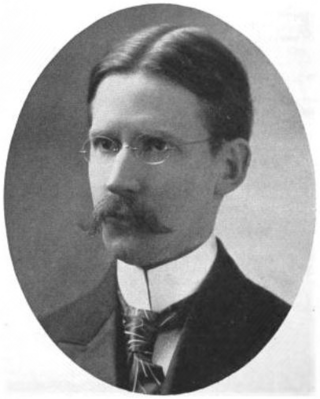
George Howells Broadhurst was an Anglo-American theatre owner/manager, director, producer and playwright. His plays were most popular from the late 1890s into the 1920s.
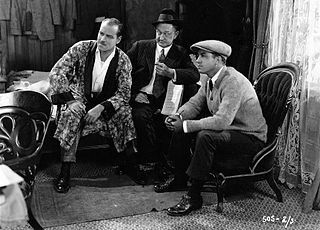
Wallace Ashley Worsley was an American stage actor who became a film actor and film director during the silent era. Over the course of his career, Worsley directed 29 films and acted in 7. He directed several movies starring Lon Chaney Sr., and his professional relationship with the actor was the best Chaney had, second to his partnership with Tod Browning.

Clay Meredith Greene was an American playwright, lyricist, poet, screenwriter, film director, stage and screen actor, theatre critic, and journalist. He was chiefly known for his work as a prolific dramatist. He was often referred to as either the "first American" or "first white American child" born in San Francisco during his lifetime; a controversial claim which the author himself was responsible for spreading. A graduate of Santa Clara University (SCU), Greene was the author of the Passion Play Nazareth which was written for and staged as part of the 50th anniversary celebration of the founding of SCU in 1901. That work was performed repeatedly every three years at SCU during Greene's lifetime.
Stanislaus Stange (1862–1917) was a playwright, librettist and lyricist who created many Broadway shows in the fin-de-siecle era and early 20th century. After minor success as an actor, Stange made his career as a writer in the musical theatre, moving towards more varied theatrical work before his death.
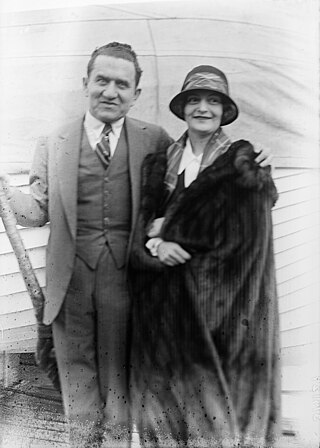
Archibald Selwyn was a Canadian-American play broker, theater owner and stage producer who had many Broadway successes. He and his brother Edgar Selwyn were partners. They were among the founders of Goldwyn Pictures, later to be merged into MGM.

Fair and Warmer is a three-act comedy play by the American writer Avery Hopwood. It was first staged at the Eltinge Theatre in New York City on November 15, 1915, running for 377 performances, featuring Madge Kennedy, John Cumberland, Janet Beecher, Ralph Morgan, Hamilton Revelle, Olive May, Robert Fisher and Harry Lorraine. Staged by Robert Milton, it was well received by critics. It is a farce about a mild-mannered banker who becomes embroiled in an innocent scheme to rekindle the romance in his marriage using his best friend's wife.
Max Freeman was a German actor, theater director, theater manager, playwright, and producer who was primarily active in the United States. After beginning his career in his native city of Berlin in 1868, Freeman eventually moved to the United States in 1871 where he began his career in America as the theatre manager for the Germania Theatre in New York City. He had a lengthy stage career as an actor in America from 1873 until his death in 1912. Known as the "godfather of comic opera", he particularly excelled in performances in roles from light operas and musical comedies, and was also responsible for directing and producing works from this genre on Broadway. He also directed and played parts in straight plays as well. His adaptation of Jacques Offenbach's Orfée aux enfers was performed for the grand opening of Broadway's Bijou Theatre in 1883, and his original musical play Claudius Nero, based on Ernest Erkstein's novel Nero, premiered at Niblo's Garden in 1890.

A Tailor-Made Man is a 1917 American play by Harry James Smith, which ran for 398 performances at the Cohan and Harris Theatre. It debuted on August 27, 1917, and played through August 1918.
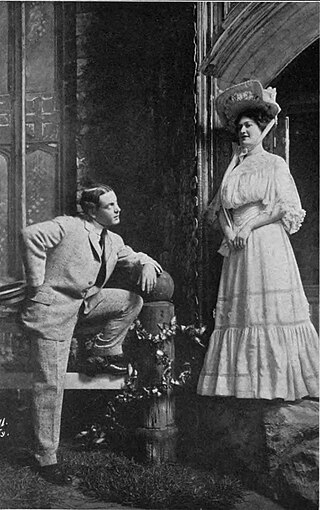
The College Widow is a 1904 American comedic play by George Ade, which was adapted to film multiple times, and also into the popular 1917 musical Leave It to Jane.

Norma Stafford Mitchell was an American actress and writer.
Over Night is a farce in three acts by Philip Bartholomae. The play takes place aboard the S.S. Hendrik Hudson, a steamboat on the Hudson River Day Line, and follows two sets of couples, the "Darlings" and the "Kettles". The work premiered on Broadway in 1911, and it was the first significant success for Bartholomae as a playwright. Bartholomae later adapted his play into a screenplay for the 1915 film of the same name which was directed by James Young and starred Vivian Martin and Sam Hardy. He later adapted this play in collaboration with Guy Bolton into the hit Broadway musical Very Good Eddie (1915) which featured music by Jerome Kern.
Ernest Albert, born Ernest Albert Brown, was an American painter, illustrator, muralist, and scenic designer. He was a prolific scenic designer, first in St. Louis and Chicago and then on Broadway. He is considered a major American landscape painter and was elected the first president of the Allied Artists of America in 1919.
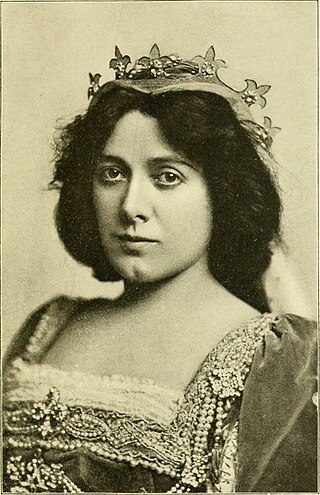
When Knighthood Was in Flower is a play in four acts by Paul Kester. It is based on the 1898 novel of the same name by Charles Major. The work premiered on Broadway at the Criterion Theatre on January 14, 1901. It ran for a total of 176 performances; closing in June 1901. The original production was produced by Charles Frohman and used sets by Ernest Albert, Frank E. Gates and Edward A. Morange. The costumes were designed by Mrs. Charles Hone and Harper Pennington. The cast was led by Bruce McRae as Charles Brandon and Julia Marlowe as Mary Tudor among others.
Benjamin Stannard Mears, also known as Ben Mears, Ben S. Mears, and Stannard Mears, was an American stage actor, vaudeville performer, and playwright. He is best known for the 1918 play Seventeen; an adaptation of Booth Tarkington's 1916 novel of the same name which he co-wrote with Hugh Stanislaus Stange.
Julius Hurtig was an American vaudeville and theatre producer.
John J. McNally was an American playwright, journalist, and drama critic. As a playwright he is best known for penning the books for many Broadway musicals staged between the years 1895–1909. Many of these were crafted for the Rogers Brothers, or were created in collaboration with the songwriting team of Jean Schwartz and William Jerome. He was a longtime drama critic and editor for various Boston newspapers.

Under Two Flags is a play in five acts by Paul M. Potter. It is based on the 1867 English novel of the same name by Ouida. It premiered at Broadway's Garden Theatre on February 5, 1901. It closed in June 1901 after 135 performances. The original production was produced by Charles Frohman and David Belasco. Belasco also directed the play which starred Campbell Gollan as the Marquis of Chateauroy, Francis Carlyle as Bertie Cecil, and Blanche Bates as Cigarette.

Treasure Island is a play in four acts and ten scenes by Jules Eckert Goodman that is based on Robert Louis Stevenson's 1883 novel of the same name. It was first published in 1915 by Samuel French, Inc., and was later included in the children's play anthology Another Treasury of Plays for Children which was edited by Montrose Jonas Moses. While not the first stage adaptation of Stevenson's novel, it was the first adaptation to achieve critical and commercial success; bringing both "fame and fortune" to its author.












